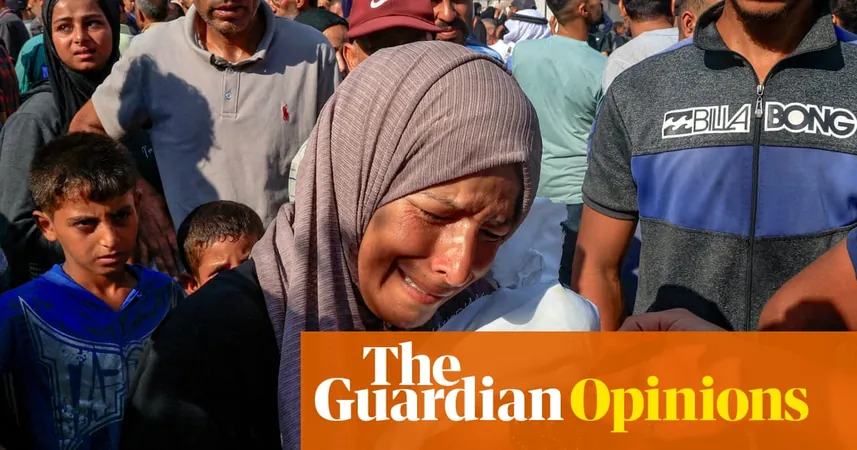
The Genocide Debate: Why Are We Reluctant to Call Israel's Actions in Gaza What They Are?
2025-07-24
Author: Yan
A Difficult Truth: The Genocide Claims in Gaza
Why is it so hard for some to acknowledge the genocide happening in Gaza? Despite compelling evidence pointing to such atrocities by the Israeli government, many nations and individuals hesitate to recognize it as genocide. This reluctance stems from Israel’s painful history as a refuge for Jewish victims of genocide, leading to an overly simplistic view of what constitutes genocide in both public and legal realms.
The Holocaust’s Lingering Halo Effect
Israel enjoys a protective aura of sympathy connected to the Holocaust, complicating perceptions of its current actions. Because the Israeli state was born from the ashes of Nazi atrocities, there’s a dissonance in believing its government could also commit genocide. This cognitive dissonance fuels a troubling narrative that erases contemporary suffering.
Wrong Lessons from Past Atrocities
Having endured genocide, one might expect Israel to champion human rights. However, some leaders have twisted the phrase �22never again�22 to justify extreme measures in the guise of self-defense—committing violations that mirror historical oppressions. The narrative becomes a tool to silence critics while justifying ongoing violence against Palestinians.
Echoes of Rwanda: A Cautionary Tale
The scenario resembles the Rwandan genocide, where the Tutsi-led Rwandan Patriotic Front, after intervening to stop a massacre, perpetrated atrocities of its own. Under Paul Kagame, the RPF’s violent tactics included mass executions and invasions under dubious pretexts, resulting in millions of Congolese deaths. Like Kagame, Israeli leaders employ self-defense rhetoric to enact aggressive policies that displace and harm civilians.
Measuring Genocidal Acts and Intent
Understanding genocide is pivotal. The Genocide Convention protects groups from actions meant to destroy them in whole or in part. The contemporary situation in Gaza aligns with this definition through relentless military actions that, while not aimed at completely eradicating Palestinians, are intended to weaken and displace them significantly.
The Grim Statistics in Gaza
Since the October 7 attacks by Hamas, over 57,000 Palestinians have lost their lives, with a tragic majority being women and children. Israeli military actions, including bombings and siege tactics, mirror those seen in historical genocides, raising grave ethical questions about intent and the treatment of civilians.
A Siege of Starvation: The Lingering Impact
The Israeli blockade has not only directly caused deaths but has also decimated infrastructure, trapping survivors in dire conditions. With essential services crippled and neighborhoods leveled, the humanitarian crisis in Gaza is severe, leading to far greater suffering and loss of life.
The International Court's Role in Defining Genocide
As the International Court of Justice (ICJ) prepares to hear a case concerning genocidal claims against Israel, a pivotal question will arise: does the evidence indicate a specific intent to exterminate or displace Palestinians? Statements from Israeli officials could be seen as indicative of genocidal intent, complicating the legal landscape.
A Call for Legal Clarity and Accountability
The ICJ's approach has historically favored interpretations that lean toward an understanding of genocide necessitating large-scale killings. However, the horrific realities in Gaza demand a reevaluation of this narrow definition. Acknowledging the intent behind Israel’s actions is crucial for accountability and justice.
Conclusion: The Urgency of Acknowledgment
The pending verdicts at the ICJ present a unique chance to redefine how we understand and apply the term genocide. If the court recognizes the suffering of the Rohingya as a genocidal act driven by ethnic cleansing motives, it could significantly impact the case against Israel. It’s essential that the complexities of these situations—where genocide and ethnic cleansing may coexist—are recognized, ensuring that history's lessons are not lost in the rhetoric.



 Brasil (PT)
Brasil (PT)
 Canada (EN)
Canada (EN)
 Chile (ES)
Chile (ES)
 Česko (CS)
Česko (CS)
 대한민국 (KO)
대한민국 (KO)
 España (ES)
España (ES)
 France (FR)
France (FR)
 Hong Kong (EN)
Hong Kong (EN)
 Italia (IT)
Italia (IT)
 日本 (JA)
日本 (JA)
 Magyarország (HU)
Magyarország (HU)
 Norge (NO)
Norge (NO)
 Polska (PL)
Polska (PL)
 Schweiz (DE)
Schweiz (DE)
 Singapore (EN)
Singapore (EN)
 Sverige (SV)
Sverige (SV)
 Suomi (FI)
Suomi (FI)
 Türkiye (TR)
Türkiye (TR)
 الإمارات العربية المتحدة (AR)
الإمارات العربية المتحدة (AR)